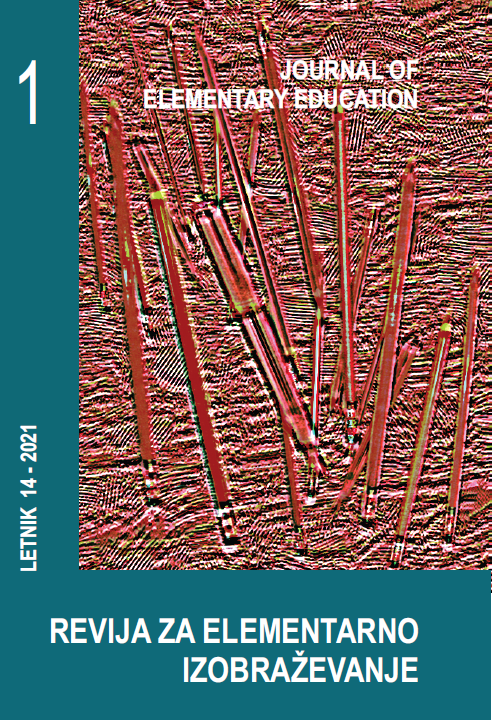Teacher Self-Assessment of their Science and Technics Competences and Professional Development
DOI:
https://doi.org/10.18690/rei.14.1.73-92.2021Keywords:
professional development, science and technics competences, class teachersAbstract
In this paper, the authors present the results of an empirical study that formed part of the broader research project, "Culture of Educational Institution as a Factor in Co-Construction of Knowledge," at the University of Rijeka. The research was conducted on a sample of 317 elementary class teachers from Croatia and Slovenia. The authors sought to establish how class teachers assess their professionalism in practice; whether they show statistically significant differences in assessing their professionalism and professional development in practice at different stages of their careers.
Downloads
References
Berliner, D. C. (1992). The nature of Expertise in Teaching. In: F. Oser, A. Dick, and J. L. Patry (Eds.), Effective and Responsible Teaching: The New Synthesis (pp. 227-249). San Francisco: Josey-Bass Publishers.
Blanuša Trošelj, D. (2018). Professional development of preschool teachers in Croatia (Doctoral dissertation). Univerze v Ljubljani. Pedagoška fakulteta.
Blažević, I. (2013). Kurikulumske kompetencije učitelja i odgojno-obrazovna praksa (Curriculum competences of teachers and educational practice). Znanstvena monografija s Drugog kongresa pedagoga u Opatiji 24.-26.9.2012. Zagreb: Hrvatsko pedagogijsko društvo, 16-27.
Bubb, S. & Earley, P. (2010). Helping Staff Development in School. London: SAGE.
Cencič, M. (2009). Kako poteka pedagoško raziskovanje: Primer kvantitativne empirične neeksperimentalne raziskave (How pedagogical research is conducted: An example of quantitative empirical non-experimental research). Ljubljana: Zavod Republike Slovenije za šolstvo.
Čepić, R., Kalin, J. & Šteh, B. (2017). Profesionalni razvoj učitelja: kontekst, perspective izazovi (Teacher professional development: context, perspectives and challenges). In: R. Čepić and J. Kalin (Eds.), Profesionalni razvoj učitelja: status, ličnost i transverzalne kompetencije, 21-44). Rijeka: Učiteljski fakultet Sveučilišta u Rijeci.
Commission of the European Communities (2008). Improving competences for the 21st Century: An Agenda for European Cooperation on Schools. Retrieved from http://ec.europa.eu/education/school21/sec2177_en.pdf
Darling Hammond, L., Holtzman, D. J., Gatlin, S. J., & Heilig, J. V. (2005). Does teacher preparation matter? Evidence about teacher certification, Teach for America, and teacher effectiveness. Education Policy Analysis Archives/Archivos Analíticos de Políticas Educativas, 13, 1-48.
Day, C., Sammons, P., Stobart, G., Kington, A. & Gu, Q. (2007). Teachers matter. Connecting work, lives and effectiveness. Maidenhead: Open University Press.
Fuller, F. (1969). Concerns of teachers: A developmental conceptualization. American Educational Research Journal, 6 (2), 207-226.
Gonzalez, L., Brown, M. S. & Slate, J. R. (2008). Teachers Who Left the Teaching Profession: A Qualitative Understanding. The Qualitative Report, 13(1), 1-11.
Huberman, M. (1992). “Teacher development and instructional mastery”. In Understanding teacher development, Edited by Hargreaves, A. & Fullan, M. 122–142. London: Cassell.
Huberman, M. (1993). The lives of teachers. London: Cassell.
Inman, D. & Marlow, L. (2004). Teacher Retention: Why Do Beginning Teachers Remain in the Profession? Education, 124(4), 605-614.
Johnson, S., Cooper, C., Cartwright, S., Donald, I., Taylor, P., & Millet, C. (2005). The experience of work-related stress across occupations. Journal of Managerial Psychology, 20(2), 178-187.
Jurčić, M. (2012). Pedagoške kompetencije suvremenog učitelja (Contemporary teacher’s pedagogical competences). Zagreb: Recedo.
Kagan, D. D. (1992). Professional Growth Among Pre-service and Beginning Teachers. American Educational Research Journal, 62(2), 129-169.
Katz, L. G. (1972). Developmental Stages of Preschool Teachers. The Elementary School Journal, 73(1), 50-54.
Kunter, M., Tsai, Y. M., Klusmann, U., Brunner, M., Krauss, S., & Baumert, J. (2008). Students’ and mathematics teachers’ perceptions of teacher enthusiasm and instruction. Learning and Instruction, 18(5), 468-482.
Kunter, M., Klusmann, U., Baumert, J., Richter, D., Voss, T., & Hachfeld, A. (2013). Professional competence of teachers: Effects on instructional quality and student development. Journal of Educational Psychology, 105(3), 805.
Lončarić, D., & Pejić Papak, P. (2009). Profiliranje učiteljskih kompetencija (Profiling teacher competences). Odgojne znanosti 11(2), 479-495.
Mlinarević, V. (2002). Učitelji odrednice uspješnog poučavanja (Teachers are the determinants of successful teaching). Život i škola, 47, 7.
Pejić Papak, P., Vujičić, L., & Arrigoni, J. (2015). Teachers’ Views on the Development of Personal Competences and Pupil Competences: Croatian Experiences. Journal of Education & Social Policy, 22 (1), 20-29.
Sagadin, J. (1993). Poglavja iz metodologije pedagoškega raziskovanja (Chapters from the methodology of pedagogical research). Ljubljana: Zavod Republike Slovenije za šolstvo.
Šagud, M. (2012). Refleksivna praksa – suvremena paradigma cjelo životnog učenja i obrazovanja (odgajatelja) (Reflective practice - the contemporary paradigm of lifelong learning (educators)). Zagreb: Filozofski fakultet.
Schön, D. A. (1983). The reflective practitioner: How professionals think in action. New York: Basic Books.
The European Parliament and Council of the European Union. (2006). Key Competences for Lifelong Learning — A European Reference Framework. Retrieved from http://eurlex.europa.eu/LexUriServ/site/en/oj/–2006/l_394/l_39420061230en00100018.pdf
Valenčič Zuljan, M. (2001). Modeli in načela učiteljevega profesionalnega razvoja. Sodobna pedagogika, 52 (2), 122-141.
Valenčič Zuljan, M. (2008). Učiteljna put profesionalnog razvoja: od početnika do eksperta (The professional path of professional development: from beginner to expert). Vršac: Visoka škola strukovnih studija za obrazovanje vaspitača „Mihailo Palov“.
Valenčič Zuljan, M. (2012). Profesionalne poti pedagoških delavcev (Professional paths of teaching staff). Vršac: Visoka škola strukovnih studija za obrazovanje vaspitača.
Valenčič Zuljan, M., & Kiswarday, V. R. (2015). The resilient teacher: the way to reach quality education in contemporary society. Odgoj u školi, 75-99.
Vujičić, L., & Pejić Papak, P. (2017). Critical-Reflective Model in the Educational Process. In: Contributions to the Development of the Contemporary Paradigm of the Institutional Childhood: An Educational Perspective, 339-351. Zurich: LIT VERLAG.
Downloads
Published
Issue
Section
License
Copyright (c) 2021 Danijela Blanuša Trošelj, Petra Peić Papak, Darjo Zuljan

This work is licensed under a Creative Commons Attribution 4.0 International License.
